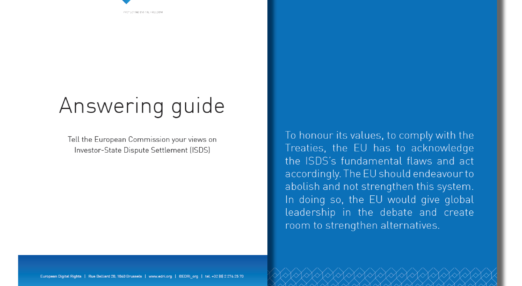Our work
EDRi is the biggest European network defending rights and freedoms online. We work to to challenge private and state actors who abuse their power to control or manipulate the public. We do so by advocating for robust and enforced laws, informing and mobilising people, promoting a healthy and accountable technology market, and building a movement of organisations and individuals committed to digital rights and freedoms in a connected world.
Filter resources
-
Irish High Court refers the Facebook/PRISM case to the CJEU
On 18 June 2014 Ireland’s High Court referred the request to investigate Facebook’s international headquarters in Ireland over its involvement in the PRISM scandal to the European Court of Justice (CJEU). CJEU was asked to review the case and to clarify whether the social network’s actions are compatible with the EU Charter of Fundamental Rights. […]
Read more
-
We are not accusing the German minister of interior of lying
On 30 June 2014, Germany’s Minister of the Interior Thomas de Maizière announced an initiative to help move forward the proposal for a General Data Protection Regulation. EDRi applauds this “initiative”, which comes after Germany has worked assiduously to stop progress in the Council. According to internal Council documents obtained by the Spiegel in December […]
Read more
-

Google and the right to be forgotten – the truth is out there
After all of the noise surrounding the Google/Spain case, the “deletion” of search results, the paedophiles whose crimes would be washed away and the end of history, the reality of the case is slowly drifting into the media. We were told by the Wall Street Journal three weeks ago that any search results that were […]
Read more
-
Romania: No communication without registration
Two bills initiated during the past month by the Romanian Government, with the direct and open support from the Romanian Secret Service (SRI), are attempting to kill any kind of electronic communication without prior identification and to expand dramatically the legal access to computer systems. The first bill aims to make the registration of all […]
Read more
-
Supreme Court of the US on cell phone searches: get a warrant
In the court case Riley vs California, the Supreme Court of the United States (SCOTUS) affirmed on 25 June what many digital rights activists have been telling a long time: Our mobile phones, especially smartphones, have become such an extension of ourselves that warrantless searches of them violate fundamental rights. Not only that, SCOTUS was […]
Read more
-
Flawed Dutch government study on ISDS
On 25 July the Dutch government published a study “The Impact of Investor-State Dispute Settlement (ISDS) in the TTIP“, requested by the Dutch Parliament. The study is flawed. A first reading reveals the following problems: It does not mention that it is nearly impossible to withdraw from trade agreements. Any mistake in the ISDS procedure […]
Read more
-
The Charter of Digital Rights
During the European elections 2014, EDRi led an innovative campaign to raise the profile of digital rights issues. To this end, EDRi’s members drafted a 10-point Charter of Digital Rights that candidates running for the European Parliament could promise to defend. Eighty-three of the candidates from 21 Member States were elected Members of the European […]
Read more
-

Answering guide to the European Commission’s consultation on ISDS
In light of the public consulation on Investor-State Dispute Settlement (ISDS) launched by the European Commission in March 2014, and EDRi in collaboration with Access, Vrijschrift and Bits of Freedom, has created an answering guide. The answering guide will help you go through the different questions asked by the Commission and provides guidelines on how […]
Read more
-
Freedom of information: EU Commission creates barriers for access to documents requests
It is crucial to know what the European institutions are up to in order to ensure that citizens’ fundamental rights are respected. Democracy requires vigilance and vigilance requires access to information. It is precisely for this reason that freedom of information legislation exists. Since the entry in force of Regulation 1049/2001 setting up the EU […]
Read more
-
Turkish government to acquire a tool to censor social media?
Turkish media reports that the government intends to buy NetClean software to remove unwanted material from Twitter. The negotiations are said to be ongoing with an exorbitant price tag of 40 million euros. NetClean is a Swedish software company that specializes in providing “intelligence solutions to block, detect and analyse digital media”. The Turkish government […]
Read more
-
Report on Snowden – Government apathy but increased public concern
In the wake of the first anniversary of Edward Snowden’s first revelations, a global analysis was published, assessing the international impact of those disclosures. The report, “A crisis of Accountability” revealed not only that had most governments entirely ignored the Snowden revelations, but that some governments including the US and the UK have been actively […]
Read more
-
Germany opens investigation on Merkel’s phone tap
Germany’s federal prosecutor annouced on 11 June 2014 that it has opened a formal investigation into the alleged monitoring of Chancellor Angela Merkel’s mobile phone by the US’s National Security Agency (NSA). The German government has reportedly announced its support to the investigation. Although Chancellor Merkel has asked the US President Barack Obama in person […]
Read more
